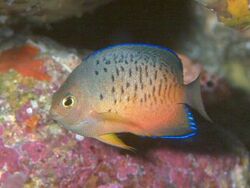Biology:Centropyge ferrugata
| Centropyge ferrugata | |
|---|---|

| |
| Scientific classification | |
| Domain: | Eukaryota |
| Kingdom: | Animalia |
| Phylum: | Chordata |
| Class: | Actinopterygii |
| Order: | Perciformes |
| Family: | Pomacanthidae |
| Genus: | Centropyge |
| Species: | C. ferrugata
|
| Binomial name | |
| Centropyge ferrugata Randall & Burgess, 1972
| |
Centropyge ferrugata, the rusty angelfish, is a species of marine ray-finned fish, a marine angelfish belonging to the family Pomacanthidae. The rusty angelfish comes from the Western Pacific Ocean and sometimes makes its way into the aquarium trade.
Description
Centropyge ferrugata has a brownish-orange body marked with black spots on the upper flanks. The caudal, dorsal and anal fins have a bright blue margin.[2] The dorsal fin contains 14 spines and 17 soft rays while the anal fin has 3 spines and 17-18 soft rays. This species attains a maximum total length of 10 centimetres (3.9 in).[3]
Distribution
Centropyge ferrugata is found in the western Pacific Ocean. Its range extends from Tanabe Bay southern Japan to southern Taiwan and the Philippines.[3]
Habitat and biology
Centropyge ferrugata is found at depths between 6 and 30 metres (20 and 98 ft).[1] They live on seaward rocky reefs and in areas of rubble, particularly with dense algal growth. The fish can be found living alone as a solitary species or living in small groups.[3] It is frequently observed grazing on mats of filamentous algae.[1] It also eats detritus, coral polyps, sponges and small gastropods.[2] This species is a protogynous hermaphrodite, the dominant female in a group will change sex if there is no male.[4]
Systematics
Centropyge ferrugata was first formally described in 1972 by John Ernest Randall (1924-2020) and Warren E. Burgess with the type locality given as a reef one half mile off the harbour of Ishigaki City, Ishigaki, Ryukyu Islands.[5] Within the genus Centropyge this species is considered, by some authorities, to be in the subgenus Centropyge.[6]
Utilisation
Centropyge ferrugata is found in the aquarium trade and it has been bred and successfully reared in captivity.[1]
References
- ↑ 1.0 1.1 1.2 1.3 Pyle, R.; Myers, R.F.; Rocha, L.A. (2010). "Centropyge ferrugata". IUCN Red List of Threatened Species 2010: e.T165849A6148052. doi:10.2305/IUCN.UK.2010-4.RLTS.T165849A6148052.en. https://www.iucnredlist.org/species/165849/6148052. Retrieved 20 November 2021.
- ↑ 2.0 2.1 "Centropyge ferrugata". Saltcorner!. Bob Goemans. 2012. http://www.saltcorner.com/AquariumLibrary/browsespecies.php?CritterID=52&filter=0. Retrieved 21 January 2021.
- ↑ 3.0 3.1 3.2 Froese, Rainer and Pauly, Daniel, eds. (2019). "Centropyge ferrugata" in FishBase. December 2019 version.
- ↑ "Centropyge ferrugata". https://reefapp.net/en/encyclopedia/centropyge-ferrugata. Retrieved 21 January 2021.
- ↑ Eschmeyer, William N.; Fricke, Ron; van der Laan, Richard, eds. "Species in the genus Centropyge". California Academy of Sciences. http://researcharchive.calacademy.org/research/ichthyology/catalog/fishcatget.asp?tbl=species&genus=Centropyge.
- ↑ "Order ACANTHURIFORMES (part 1): Families LOBOTIDAE, POMACANTHIDAE, DREPANEIDAE and CHAETODONTIDAE". The ETYFish Project Fish Name Etymology Database. Christopher Scharpf and Kenneth J. Lazara. 21 July 2020. http://www.etyfish.org/acanthuriformes1/. Retrieved 21 January 2021.
Wikidata ☰ Q3108591 entry
 |


